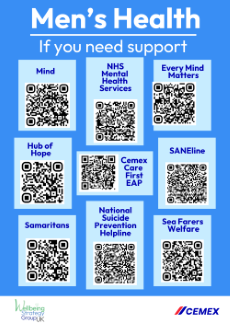We all have times when our mood is low, and we feel sad or fed up. Often these feelings happen for a reason and pass on their own. But if these feelings last for weeks at a time or become so bad that they interfere with daily life, this might be depression. Depression is a long-lasting mood disorder. It lasts for weeks or months, rather than just a few days. It affects your ability to do everyday things, feel pleasure in activities, and can affect sleep and appetite.
Depression is:
- a mental illness
- common
- something that anyone can get
- treatable.
Depression isn’t:
- something you can ‘snap out of’
- a sign of weakness
- something that everyone experiences
- something that lasts forever
Rethink Mental Illness has produced an excellent factsheet explaining the causes and symptoms of depression and how it’s treated. You can find it HERE.
While there isn’t a different sort of ‘male depression’, some symptoms are more common in men than women. These include irritability, sudden anger, increased loss of control, risk-taking and aggression. Men may also be more likely to use alcohol and drugs to cope with their depression rather than talking about it. They may use escapist behaviour too, such as throwing themselves into their work.
Read more about the symptoms of depression and ways to get support. The NHS recommends that you should see your GP if you experience any symptoms of depression for most of the day, every day, for more than two weeks.
Signs of Depression: Psychological
- a persistent low mood or sadness
- feelings of hopelessness or helplessness
- low self-esteem
- feeling tearful, guilt-ridden, irritable or intolerant of others
- having little motivation or interest in things
- a difficulty making decisions
- not getting any enjoyment out of life
- feeling anxious or worried
- having suicidal thoughts or thoughts of harming yourself
Physical Signs of Depression
- speaking or moving more cautiously than usual
- changes in appetite as well as weight loss or weight gain
- constipation
- aches and pains with no cause
- a general lack of energy
- low sex drive
- disturbed sleep
Social Signs of Depression
- poor performance at work
- avoiding meeting up with friends and taking part in fewer social activities
- disinterest in usual hobbies and interests
- difficulties in people’s home and family life
Online Resources
If you recognise any of the above symptoms in yourself, or a friend or family member, here are some resources for supporting yourself, and for supporting someone else:
Learning more about depression:
- The charity MIND, have a video explaining depression – you can watch it HERE. You’ll learn what depression is, and how look after yourself if you experience it. And you’ll find tips for supporting someone else with depression. https://www.mind.org.uk/information-support/types-of-mental-health-problems/depression/about-depression/
Coping with depression
- NHS: https://www.nhs.uk/mental-health/self-help/tips-and-support/cope-with-depression/
- Mental Health Org: https://www.mentalhealth.org.uk/explore-mental-health/a-z-topics/depression
If you are worried about someone
- MIND: https://www.mind.org.uk/information-support/types-of-mental-health-problems/depression/for-friends-and-family/
- CALM – https://www.thecalmzone.net/guides/worried-about-someone
- NHS – How to help someone with depression: https://www.nhs.uk/mental-health/advice-for-life-situations-and-events/how-to-help-someone-with-depression/
Further support
We also have a poster with QR codes to many different support groups. You can find it on the UK News website: here
